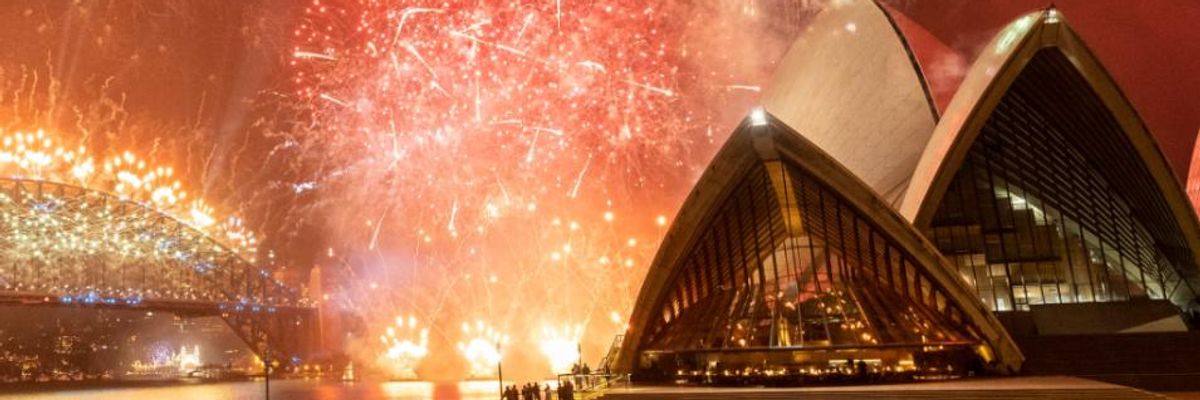With the number of new Covid-19 cases growing faster than ever around the world, and more than a dozen countries reporting cases of the new, more contagious coronavirus variant that was first detected in the U.K., major New Year's events have been canceled in large cities and officials are doubling down on pleas for people to stay at home for their own celebrations.
As the clock struck 12:00 midnight in Sydney, Australia, the city's usual fireworks display was cut to just seven minutes and instead of gathering at the iconic Sydney Opera House, most residents watched the event on television.
The precautions were taken despite Australia's relatively low number of Covid-19 cases. Sydney reported 90 cases last week connected with an outbreak in its Northern Beaches region. The outbreak prompted state governments in Australia to ban travel from the capital of New South Wales.
Countries including New Zealand--where life has returned largely to normal after the government increased healthcare spending early on in the pandemic and instituted strict lockdown measures, largely eliminating the virus--and Taiwan, where about 700 cases have been confirmed since January 2020 and seven people have died of Covid-19, went ahead with their New Year's celebrations.
In New York, the annual countdown ball is still set to drop at midnight in Times Square, but only a group of 40 pre-screened healthcare and essential workers and their families will be in attendance, separated into eight-by-eight foot pens to observe social distancing.
"There are absolutely no spectators allowed in Times Square," Terence A. Monahan, the New York Police Department chief, told the New York Times. "Don't even attempt to come down there and watch it."
Police were also erecting barriers in Puerta del Sol in Madrid, while authorities in Berlin said they would "punish violators consistently" if they were found to be selling fireworks leading up to New Year's Eve. The annual show at the Brandenberg Gate was called off.
The muted and canceled celebrations come more than a year after the coronavirus pandemic is thought to have first begun as an outbreak in Wuhan, China, eventually spreading to nearly every country on the planet and sparking major outbreaks in countries including Italy, Iran, and the United States, which set a daily record for the third day in a row Thursday for hospitalizations and deaths from Covid-19.
While President Donald Trump--who has spent the year frequently downplaying the threat of the coronavirus and flouting public health guidelines, eventually hosting what was believed to be a super-spreader event that led to his own infection--had planned to host a New Year's Eve party at his Florida resort before returning early to Washington, D.C., officials in the U.S. urged Americans not to gather for the holiday.
Dr. Grant Colfax of the San Francisco Department of Public Health warned that large gatherings on Thursday night could be "catastrophic" for healthcare systems across the country. Last week, nearly one-fifth of U.S. hospitals reported their intensive care units were at least 95% full.
"If we see a surge like we did from Thanksgiving, we will see thousands more people in the hospital, hundreds more people dying," Colfax said.
The Centers for Disease Control and Prevention advised Americans "to celebrate at home with the people who live with you or virtually with friends and family."
In Texas, Harris County officials pointed to reports showing that 60% of ICU beds are now occupied by Covid-19 patients as they advised residents to celebrate only with people in their immediate households.
The end of 2020 comes as scientists are expressing alarm about the spread of B.1.1.7., the coronavirus variant which has now been detected in California and Colorado and is believed to have been spread within communities by people who haven't traveled to the U.K., where the variant was first reported in September.
The variant is not thought to be more deadly than the original and scientists say current vaccines that are being rolled out are expected to be effective against it, but it is believed to be more transmissible--leading to concerns that it will bring about an increase in hospitalizations.
"The bottom line is that anything we do to reduce transmission will reduce transmission of any variants, including this one," virologist Dr. Angela Rasmussen told the New York Times.




